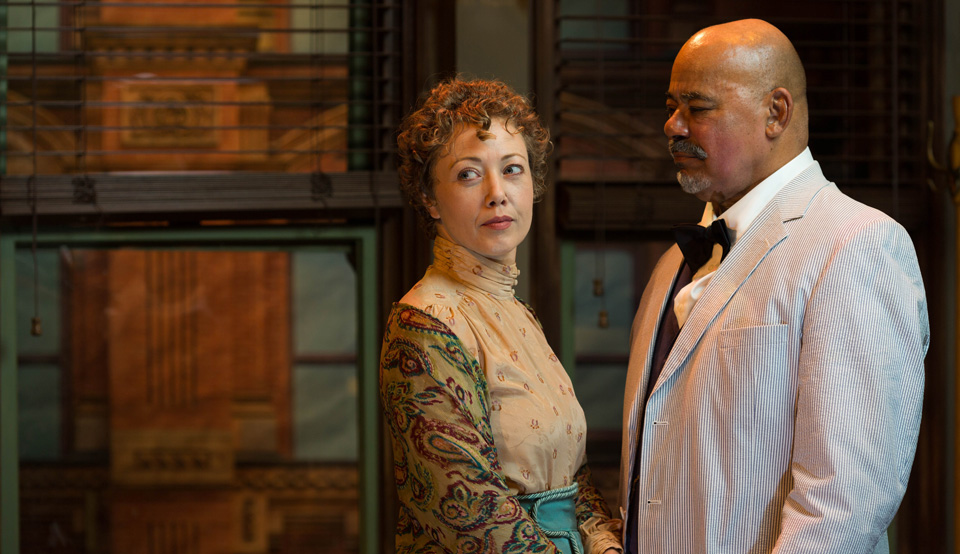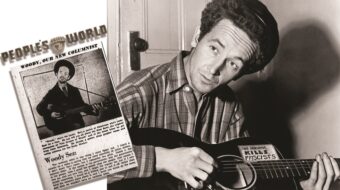
LOS ANGELES—By the time this appears the monthlong run of Dr. Du Bois and Miss Ovington in its West Coast premiere will unfortunately have ended. But for the record—and for the edification of any thoughtful small-theatre producers out there—this is a highly worthwhile dramatic property that deserves wider audiences.
Presented by the Robey Theatre Company at Los Angeles Theatre Center in downtown L.A., Clare Coss’ play imagines a single day in June 1915 in the New York City office of the National Association for the Advancement of Colored People (NAACP), which W.E.B. Du Bois, Ph.D., and Mary White “May” Ovington co-founded on February 12, 1909 (Abraham Lincoln’s hundredth birthday—and also Charles Darwin’s, by the way). Other co-founders included African American journalist-muckraker Ida B. Wells and a prestigious group of white supporters who felt morally charged to do something about what Dr. Du Bois defined as “the problem of the twentieth century”—“the problem of the color line.”
W.E.B. Du Bois, born in Great Barrington, Mass., to Dutch, French and African ancestry, went on to become the leading Black intellectual of his time, the first Black Ph.D. from Harvard, author of numerous books about race in America, tireless activist for civil and human rights, and toward the end of his long life (he died at 95 on the eve of the 1963 March on Washington), a proud card-carrying member of the Communist Party USA.
We catch him on this warm day in June, in his natty seersucker suit and vest, complete with fashionable spats atop his shoes, at the age of 47, just the midpoint of what would become his generous span on Earth.
There can’t be very many plays featuring Du Bois as a character, but as it turns out, there is at least one other, another Robey production called Knock Me a Kiss, in which the esteemed scholar was also played by our current Du Bois, Robey Theatre Producing Artistic Director Ben Guillory—who also directed this two-character show. NAACP board member and volunteer office manager May Ovington is played sensitively and intelligently by Melanie Cruz.
The one-hour forty-five minute play is an extended conversation focusing on Du Bois’ latest threat to resign from the NAACP, infuriated by the condescension and opposition he perceives coming from white board members of the organization. He is the only Black person in a leadership role in the NAACP, but feels powerless—a dynamic that saw a replay in the 1960s before the Black Power movement rightly reset the role of people in color in their own civil rights struggle.
The playwright does a fine job of balancing Du Bois’ admittedly headstrong willfulness with the reactive stance of his board, which wants to rein him in. Among his complaints is that white people do not support the Negro cause, but some white NAACP members chafe at being scorned for showing up with their good will and financial contributions.
Because she shares office space with Du Bois on a regular basis, Miss Ovington has come to know him well. While revering his erudition and passion, she nevertheless believes that his principled resignation would be disastrous both for himself and the organization, and she attempts to dissuade him from what she is convinced is a destructive course of action. “Is the word ‘compromise’ in your vocabulary?” she asks him. Without his even realizing it, she has become de facto his most signifiant confidante.
It becomes apparent that she—a suffragist and women’s emancipationist, a socialist and pacifist completely opposed to the world war then in progress—is at least his equal as a strategically nuanced thinker. He can fulminate all he wants about the “color line”—and it is very real in 1915—but there is also the discrimination against women that Ovington has experienced and that she articulates with elegant pithiness.
More than once, Du Bois voices his opinion that if young Negro men could serve in the war effort—the U.S. would enter World War I two years later—it would reflect well on their abilities and loyalty, and contribute to wider acceptance. Great leader though he was even then, Du Bois still had further roads to travel ideologically. He was an instinctual Marxist who saw the critical aspect of class in the intersectional movements of his day.
Along the way the pair bring up lynching, segregation, prejudices recalled from childhood, editorial policy on The Crisis, the NAACP magazine that Du Bois edits, protests against screenings of D.W. Griffith’s racist new film The Birth of a Nation, current popular music and an African song that Du Bois learned at his great-great-grandmother’s knee. A pro-war demonstration takes place outside on the street below, and there is an ugly incident prompted by some faithful passing churchgoer who through the window happens to spot the Black man and white woman together in the same room.
Du Bois’ wife and daughter are living in England. The early death of their son some years back strongly impacted the marriage, and Du Bois, in America, is still a healthy, virile man who evidently is able to catch the eye of many a lady out on his lecture circuit. There is also a certain frisson between him and Miss Ovington, which has to be reconciled. He teaches her how to play the spoons, which functions as a play on words: Remember “spooning” as a synonym for flirting and petting, and for a certain position in bed?
Amusing is the way current technology is integrated into the play. Calls come in on an old-timey telephone, Ovington writes letters on a rickety vintage typewriter, Du Bois uses a dictation device that records onto wax cylinders, there’s a wind-up phonograph on which Du Bois plays a moving spiritual sung by the Fisk Jubilee Singers, and there’s a pneumatic tube in the office, which would have been fun to see in use, but sadly was purely decorative.
Dr. Du Bois and Miss Ovington is fascinating expedition into the character of two historical figures, now made flesh-and-blood human beings, whose actions would impact the lives of millions. The NAACP is to this day the single largest civil rights organization in the country. The expository writing, with little physical action, sets a deliberate pace, but the conversation holds the viewer’s interest grippingly. We are eye witnesses to history.
The Robey Theatre Company (named for Paul Robeson) is in its third decade devoted to excellence in Black theatre, depicting the experiences of the Black diaspora. For further information about the company, see here.












Comments